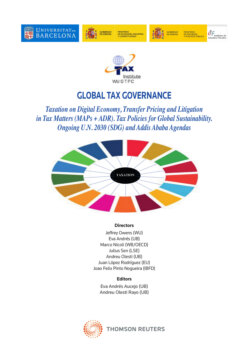Читать книгу Global Tax Governance. Taxation on Digital Economy, Transfer Pricing and Litigation in Tax Matters (MAPs + ADR) Policies for Global Sustainability. Ongoing U.N. 2030 (SDG) and Addis Ababa Agendas - Jeffrey Owens - Страница 13
На сайте Литреса книга снята с продажи.
Presentation 3 Taxation of the digital economy: challenges for the policy makers
ОглавлениеJulius Sen
Associate Director and Senior Programme Advisor at LSE Enterprise
Measures to deal with the covid pandemic are forcing governments to spend heavily while also curtailing many forms of domestic and international economic activity. Government incomes are thus falling while expenditure is rising, and the gap is filled, in the main, by borrowing. For countries that borrow in their own currencies (like the US, EU, Japan and a few others), this is not as big a worry as for countries that have to borrow internationally to finance their deficits or pay their debts, once they have run down their international currency reserves.
Measures to meet these deficit and debt obligations are likely to force policy makers around the world to renew pressure on the OECD to come up with an agreed international taxation system for the digital economy - a process that was stalled by the Trump administration opposing some aspects of the approach developed by the OECD. Failing this, some of the bigger economies (especially the EU) could move unilaterally to implement taxation measures for the digital economy.
To be sure, other policy options exist. Proposals to tax international currency transactions (the Tobin tax) could also raise huge amounts, but here too an international agreement would be needed to make it effective. Unilateral measures are also possible (for both the digital economy and for international currency transactions) but for a variety of reasons, mainly to do with scale and power, would be difficult for smaller countries to implement and would thus not resolve the fiscal problems of many countries.
The key to an agreement is the position of United States. Not only is theirs the largest economy in the world, but their currency –the dollar– is the main currency used in international trade and currency transactions. More than 63% of all global contracts are denominated in US dollars. Getting the US to agree will therefore be crucial to any outcome.
As things currently stand with a new US administration in office, the chances of reaching an agreement have risen. But the power of corporate interests –in the US and elsewhere– is still being deployed aggressively to prevent progress at both international and national levels. At the same time, it is many of these same corporates that have benefitted disproportionately from the global surge in online economic activity. So the pain of a new tax should be easily borne by this sector without much difficulty.
These issues also overlap with two other debates. Many of the big digital companies are being increasingly targeted for their anti-competitive practices and so may be forced to shrink in size, while a globally transparent system of taxation will effectively reveal the scale, extent and spread of illegal economic activity as accounts and numbers relating to transfers and transactions are reconciled across the world. Estimates suggest that this may represent up to 20% of global economic activity. Opposition to globally coordinated taxation measures thus comes from many sources and for many reasons, and it will test the resolve of policy makers to find a way forward.
